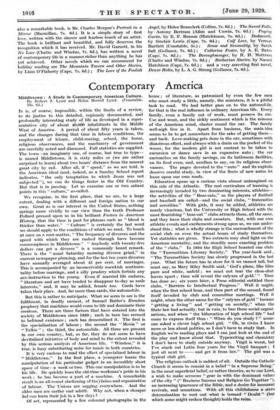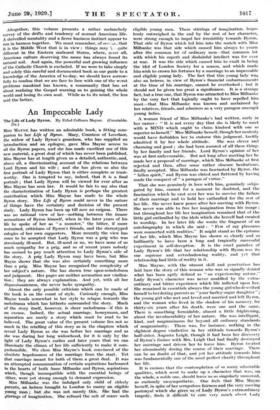Contemporary America
IT is, of course, impossible, within the limits of a review, to do justice to this detailed, copiously documented, and profoundly interesting study of life as developed in a repre- sentative city of about 40,000 inhabitants in the Middle West of America. A period of about fifty years is taken, and the changes during that time in labour conditions, the employment of leisure, child-rearing, school, the home, religious observances, and the machinery of government are carefully noted and discussed. Full statistics are supplied. The town—an imaginary one, of course, but true to type— is named Middletown, it is sixty miles or (we are rather surprised to learn) about two hours' distance from the nearest great city by rail. After all, if " speed," as we are told, is the American ideal (and, indeed, as a Sunday School report indicates, " the only temptation to which Jesus was not subjected "), we can do things faster in the Old Country. But that is in passing. Let us examine one or two salient points in this " culture," so-called.
We recognize, in the first place, that we are, to a large extent, dealing with a different and foreign nation to our own. Great as is our interest in the United States, nothing springs more vividly to our view than the truth Professor Pollard pressed upon us in his brilliant Factors in .American History, that the time is past for phrases such as " blood is thicker than water." " Culture " is certainly the last word we should apply to the conditions of which we read. To touch at once on a root-matter, " The frequency of divorces and the speed with which they are rushed through have become commonplaces in Middletown." " Anybody with twenty-five dollars can get a divorce " is a commonly heard remark. There is the " usual Saturday morning divorce 'grind," in current newspaper phrasing, and for the last ten years divorces have annually averaged about 45 per cent. of marriages. This is accompanied by an inconceivably mawkish sentimen- tality before marriage, and a silly prudery which forbids any sex-instruction to the young. Even if married life endures, `` literature and art have tended to disappear to-day as male interests," and, it may be added, female too. Cards have taken their place. And, far more than cards, the automobile.
But-this is rather to 'anticipate. What we seem to see is the fulfilthent, in deadly earnest, of Samuel Britler's Erewhon prophecy that maehines would come to life and creators. There are three factors that haxie entered into the society of Middletown since 1880 ; each in turn has seemed to befriend existence ; each has demoralized it The first is the specialization of labour ; the second the " Movie " or " Talkie " ; the third, the automobile. All three are present in our own country; but, so far, they do not seem to have devitalized initiative of body and mind to the extent revealed by this serious analysis of American life. " Wireless," it is true, is busy substituting noise for music in both countries.
It is very curious to read the effect of specialized labour in " Middletown." In the first place, a youngster learns the manipulation of his particular gadget in an incredibly short space of time—a week or two. This one manipulation is to be his life. He quickly loses the old-time workman's pride in his work ; he has become a part of a machine. A remarkable result is an all-round slackening of the claims and organization of labbur. The "Unions are sagging everywhere. And the older men are earlier east adrift. Why not, when a cheaper lad can' learn their job in a few days ?
Of art, represented by a few coloured photographs in the home ; of literature, as patronized by even the, few men who must study a little, namely, the ministers, it is a pitiful task to read. We had better pass on to the automobile, for that is the real influence in ordinary American life. Every family, even a family out of work, must possess its car. Use and wont, and the sickly sentiment which is the miasma of the American mind, cluster round the car. The family well-nigh live in it. Apart from business, the main idea seems to be to get somewhere for the sake of getting there-- and back. Love-making gets done in the car, sometimes with disastrous effect, and always with a drain on the pocket of the wooer, for the modern girl is not content to be taken to excursion or dance save in an expensive auto ; the car encroaches on the family savings, on its bathroom facilities, on its food even, and, needless to say, on its religious obser- vances. The pages devoted to the " auto " and its exploits deserve careful study, in view of the fleets of new autos let loose upon our own roads.
Education opens up a curious vista almost unimagined on this side of the Atlantic. The real curriculum of learning is increasingly invaded by two dominating interests, athletics— the activities of the " Bear-cats," as the players of football and baseball are called—and the social clubs, " fraternities and sororities." With girls, it may be added, athletics are nearly vicarious, but the University or High School with the most flourishing " bear-cat " clubs attracts them, all the same, and they have their clubs and sweaters. But, with our own athletic events and excitements strong upon us, we can under- stand this ; what is wholly strange is the encroachment of the social club on even the actual hours of study themselves. Yet statistics are given. Two extracts may shed light on the American mentality, and the steadily more exacting problem of the " clubs." In 1894 the High School boasted one club: the " Turemethian Literary Society." The year-book said , " The Turemethian Society has slowly progressed in the last year. What the future has in store for it we cannot tell,' but must say, as Mary Riley Smith said, ' God's plans, like lilies pure and white, unfold ; we must not tear the close-shut leaves apart ; time will reveal the calyxes of gold."' Time has done so ; six years later, a Press editorial entitled these clubs, " Barriers to Intellectual Progress." . Well it might, when the first school hour, and then part of the second, found ' itself invaded by club and committee meetings. Well it might, when the other name for the " calyxes of gold " became ," getting a living " and " getting on socially," when the State law had actually, but in vain, to ban these social organi- zations, and when " the bifurcation of high school life " had come to express itself thus : " When do you study ? " some- one asked a clever high school girl. " Oh, in civics I know more or less about politics, so I don't have to study that. In English we're reading plays and I can just look at the end of the play and know about that. Typewriting and chemistry I don't have to study outside anyway. Virgil is worst, but I've stuck out Latin four years for the Virgil banquet ; I just sit next to — and get it from her." The girl was a typical club girl.
The religious outlook is saddest of all. Outside the Catholic Church it seems to consist in a belief " in a Supreme Being." in the most superficial belief, or rather theories, as to our Lord, a wish to make sermons " gear in with the dominant values of the city " (" Business Success and Religion Go Together "), an increasing ignorance of the Bible, and a desire for incessant revivals, and sensations. With all this childishness a stern determination to root out what is termed " Doubt " (but which some might reckon thought) holds the reins. Altogether, this volume presents a rather melancholy survey of the drifts and tendency of normal American life. A shrivelled mentality and a fierce business instinct appear to run in harness together. We must remember, of eor_;.•e, that it is the Middle West that is in view ; things may rt quite different in the Eastern seaboard States, where, alter all, American culture deserving the name has always found its natural soil. And again, the powerful and growing influence of the Catholic Church is excluded. If we were to take simply and solely this careful and documented book as our guide to a knowledge of the America of to-day, we should have sorrow- fully to confess that we are face to face with one of the worst problems mankind has known, a community that has set about realizing the Gospel warning as to gaining the whole world and losing its own soul. While as to its mind, the less said the better.









































 Previous page
Previous page